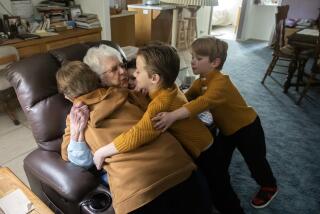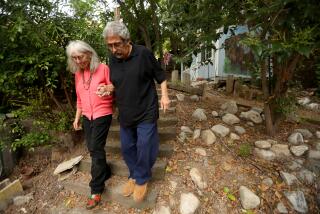Handicapped Youngsters ‘Adopt’ Struggling Family : Dying Man, Students Form Strong Bond
- Share via
DAVENPORT, Fla. — Deep in thought, the dying man gazes across the green fields behind his trailer house. The only sounds are those of summer birds and several puppies yapping in a nearby pen, ignoring the pair of black bears pacing in their steel enclosure.
Immobile in his wheelchair, Mike Aria takes a deep breath, causing the weakened muscles of his neck to bulge slightly. It takes all his strength just to talk, so he chooses his words carefully.
Aria, a 38-year-old former animal trainer, is dying of ALS--amyotrophic lateral sclerosis, commonly called Lou Gehrig’s Disease.
“Even if I feel completely down in the morning, when I see the kids I’m animated. A load has been lifted off me,” he says in strained, slurred speech, a smile covering his face.
The children Aria speaks of are 300 handicapped students at Roosevelt Vocation School in Lake Wales, 16 miles south of this rural community in central Florida.
The 7th- through 12th-graders, explained Principal Harold Maready, have learning disabilities, emotional problems, hearing impairment or are mentally handicapped.
Began as a Christmas Project
What began as a student Christmas project in 1985 to help the needy, Maready says, became a bond between these afflicted children and Mike Aria.
When they learned that Aria was paralyzed from the neck down and dying and that he and his wife, Janice, and their 8-year-old daughter, Amber, existed on $575 a month Social Security benefits, they made a decision.
“After that Christmas, it was the kids’ decision to keep it going,” Maready recalls. “They turned it into an adoption.”
Through cake and candy sales, car washes, auctions and fund raising, the handicapped children have provided Aria with a motorized wheelchair and an electric page-turner to help him read.
When they learned of Aria’s love for nature, they laid pebble trails for his wheelchair through his family’s 10 acres of greenery. Then they bought lumber and built a ramp so he could manipulate his wheelchair in and out of his trailer house. Last year they built an outside bathroom and shower, making it easier for his wife to help Aria bathe.
“He’s one of my friends,” said one of the providers, Donna Ellzey, 18, a senior from Bartow who visited Aria on vacation. “I feel I’ve done something real good for somebody when I help him.”
Writes a Newsletter
Another way she helps is by writing a newsletter to keep Roosevelt students informed of Aria’s activities.
“He gives us so much in return by letting these kids be part of his life,” Maready says. “Mike teaches the kids that they have something to give the world.”
Mike and Janice, both from New Jersey, were high school sweethearts.
In her senior year at New York University, Janice took an independent study course at Ringling Bros. and Barnum & Bailey’s Circus’s clown school in Venice, Fla. Though joining the circus was never an original goal, she soon became a featured performer.
After college, Mike, an athletic 210-pounder, joined her and took up training wild animals--bears, elephants, leopards, lions. They were married in 1974.
In 1978, Janice Aria’s brother, Gil Gillespie, left his job as a schoolteacher and the three of them formed their own act, using North American black bears, and went on tour.
In 1983, Aria began to experience an occasional slurring of speech. Then, the strength in his hands deteriorated.
No Known Cure
“That December, they told us Mike had a motor neuron disease causing the muscles to atrophy,” his wife says. “There’s no known cause or cure.”
The following year paralysis consumed Aria’s body and their circus careers came to an end. With two favorite bears and a number of dogs from their act, they moved here. Gillespie lives in a small trailer in back, works in the area as a stage artist and helps support the Aria family.
Janice Aria provides constant care. To visitors, they appear as young lovers.
“We were so right to run away and join the circus,” she reflects. “It was a romantic kind of thing to do.”
Aria is well aware that ALS is usually terminal after five years.
“Right now, I’m living on borrowed time,” he said with equanimity, “but I have my wife, daughter, brother-in-law--and the kids.”
More to Read
Sign up for Essential California
The most important California stories and recommendations in your inbox every morning.
You may occasionally receive promotional content from the Los Angeles Times.










